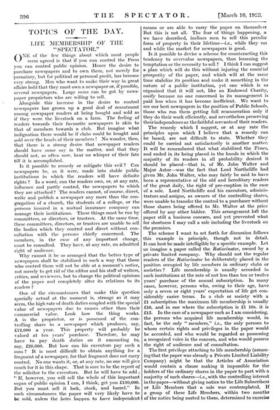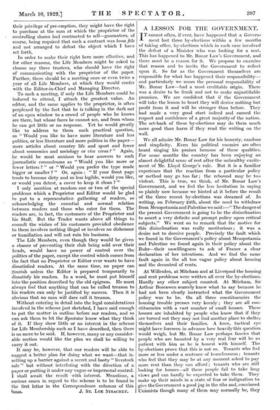TOPICS OF THE DAY.
LIFE MEMBERSHIP OF THE "SPECTATOR."
ONE of the few things about which most people seem agreed is that if you can control the Press you can control public opinion. Hence the desire to purchase newspapers and to own them, not merely for pecuniary, but for political or personal profit, has become very strong. Men who want to make their way in great affairs hold that they must own a newspaper or, if possible, several newspapers. Large sums can be got by news- paper proprietors who arc willing to sell. Alongside this increase in the desire to control newspapers has grown up a good deal of resentment among newspaper readers at being bought and sold as if they were the livestock on a farm. The feeling of readers towards their favourite newspapers is akin to that of members towards a club. But imagine what indignation there would be if clubs could be bought and sold over the heads of their members ! No wonder, then, that there is a strong desire that newspaper readers should have some say in the matter, and that they should not, as often now, hear no whisper of their fate till it is accomplished. Is it possible to remedy or mitigate this evil ? Can newspapers be, as it were, made into stable public institutions in which the readers will have definite rights ? In a word, can the readers own, or, at any rate, influence and partly control, the newspapers to which they are attached? The readers cannot, of course, direct, write and publish a newspaper any more than the con- gregation of a church, the students of a college, or the persons insured in a mutual insurance company can manage their institutions. These things must be run by committees, or directors, or trustees. At the same time, these committees, directors, or trustees are unable to sell the bodies which they control and direct without con- sultation with the persons chiefly concerned. The members, in the case of any important change, must be consulted. They have, at any rate, an admitted right of audience. Why cannot it be so arranged that the better type of newspapers shall be stabilized in such a way that those who control them will not be able at a moment's notice, not merely to get rid of the editor and his staff of writers, critics, and reviewers, but to change the political opinions of the paper and completely alter its relations to its readers ?
One of the circumstances that make this question specially actual at the moment is, strange as it may seem, the high rate of death duties coupled with the special value of newspapers due to causes other than their commercial value. Look how the thing works. A is the proprietor, or is possessed of the con- trolling share in a newspaper which produces, say, £12,000 a year. This property will probably be valued at ten years' purchase. Therefore, he may have to pay death duties on it amounting to, say, /20,000. But how can his executors pay such a sum ? It is most difficult to obtain anything for a fragment of a newspaper, for that fragment does not carry control. No one wants it, or, at any rate, no one will give much for it in this shape. . That is sure to be the report of the solicitor to the executors. But he will have to add "If, however, you will sell the whole of this important organ of public opinion I can, I think, get you £180,000. But you must sell it lock, stock, and barrel." In such circumstances the paper will very likely have to be sold, unless the heirs happen. to have independent means or are able to carry the paper on themselves But this is not all. The fear of things happening, a we have described, inclines men to sell this peculia: form of property in their lifetime—i.e., while they cam and while the market for newspapers is good.
Is it possible to devise a scheme for counteracting this tendency to overvalue newspapers, thus lessening the temptation or the necessity to sell ? I think I can suggest a plan which will do this without injuring the essential prosperity of the paper, and which will at the same time stabilize its position and make it something in the nature of a public institution, yet one which is so organized that it will not, like an Endowed Charity, ossify because no one concerned in its management is paid less when it has become inefficient. We want to see our best newspapers in the position of Public Schools, those who run them getting full remuneration only if they do their work efficiently, and nevertheless preserving their independence as the faithful servants of their readers.
The remedy which I suggest, or at any rate the principles upon which I believe that a remedy can be based, are not difficult to state. Whether they could be carried out satisfactorily is another matter. It will be remembered that what stabilized the Times, and ended in its being placed in the hands in which the majority of its readers in all probability desired it should be placed—that is, of Mr. John Walter and Major Astor—was the fact that Lord Northcliffe had given Mr. John Walter, who may fairly be said to have been a representative of the old and hereditary readers of the great daily, the right of pre-emption in the case of a sale. Lord Northcliffe and his executors, adminis- trators and assigns, as owners of the controlling shares, were unable to transfer the control to a purchaser without those shares being offered to Mr. Walter at the price offered by any other bidder. This arrangement left the paper still a business concern, and yet prevented what for shortness I may call a sale including the livestock on the premises.
The scheme I want to set forth for discussion follows this example in principle, though not in detail. It can best be made intelligible by a specific example. Let us imagine a paper called the Ratiocinator, owned by a private limited company. Why should not the regular readers of the Ratiocinator be deliberately placed in the position occupied by life members in ordinary club§ or societies ? Life membership is usually accorded in such institutions at the rate of not less than ten or twelve years' purchase of the annual subscription. In many cases, however, persons who, owing to their age, have only a seven or eight years' expectation of life get con- siderably easier terms. In a club or society with a El subscription the maximum life membership is usually /10, and in one where the subscription is £1 10s. it is £15. In the case of a newspaper such as I am considering, the persons who acquired life membership would, in fact, be the only "members," i.e., the only persons to whom certain rights and privileges in the paper would be accorded, and who would be regarded as possessing a recognized voice in the concern, and who would possess the right of audience and of consultation.
The first privilege attaching to life membership (assum- ing that the paper was already a Private Limited Liability Company) might be that the Articles of Association would contain a clause making it impossible for the holders of the ordinary shares in the paper to part with a majority of such shares—i.e., with the controlling interest in the paper—without giving notice to the Life Subscribers or Life Members that a sale was contemplated. If a group of these Life Members, within two months of the notice being posted to them. determined to exercise their privilege of pre-emption, they might have the right to purchase at the sum at which the proprietor of the controlling shares had contracted to sell—guarantees, of course, being required that such a contract was bona fide and not arranged to defeat the object which I have set forth.
In order to make their right here more effective, and for other reasons, the Life Members might be asked to choose say three trustees, who should have the right of communicating with the proprietor of the paper. Further, there should be a meeting once or even twice a year of all Life Members, at which they would confer with the Editor-in-Chief and Managing Director.
To such a meeting, if only the Life Members could be induced to attend, I attach the greatest value. An editor, and the same applies to the proprietor, is often perplexed by the fact that he is talking in the dark out of an open window to a crowd of people who he knows are there, but whose faces he cannot see, and from whom he can get little or no response. Yet he would greatly like to address to them such practical question, as "Would you like to have more literature and less politics, or less literature and more politics in the paper— more articles about country life and sport and fewer about economics and sociology or vice versa ?" Again, he would be most anxious to hear answers to such journalistic conundrums as "Would you like more or fewer letters ? " or "Would you prefer the type made bigger or smaller ? " Or, again : "If your front page tends to become dirty and so less legible, would you like, or would you detest, a cover to keep it clean ? "
I only mention at random one or two of the special problems which a Proprietor and Editor would be glad to put to a representative gathering of readers, so acknowledging the essential and normal relation between readers and those who cater for them. The readers are, in fact, the customers of the Proprietor and his Staff. But the Trader wants above all things to consult the wishes of his customers provided obedience to them involves nothing illegal or involves no dishonour or humiliation and will not ruin his business.
The Life Members, even though they would be given a chance of preventing their club being sold over their heads, would have no power of control over the politics of the paper, except the control which comes from the fact that no Proprietor or Editor ever wants to have dissatisfied readers. At the same time, no paper can nourish unless the Editor is prepared temporarily to dissatisfy his readers. In a word, he must put himself into the position described by the old epigram. He must always feel that anything that can be called treason to his readers can only be justified by success. Then it is obvious that no man will dare call it treason.
Without entering in detail into the legal considerations involved in the scheme just sketched, I have said enough to put the matter in outline before our readers, and so can ask them to let the Spectator know what they think of it. If they show little or no interest in the scheme for Life Membership such as I have described, then there is no more to be said. If, however, many or any consider- able section would like the plan we shall be willing to carry it out.
It may be, however, that our readers will be able to suggest a better plan for doing what we want—that is, setting up a barrier against a secret and hasty "livestock sale" but without interfering with the direction of a paper or putting it under any vague or impersonal control. I shall await the result with interest. Meantime, a curious omen in regard to the scheme is to be found in the first letter in the Correspondence columns of this











































 Previous page
Previous page